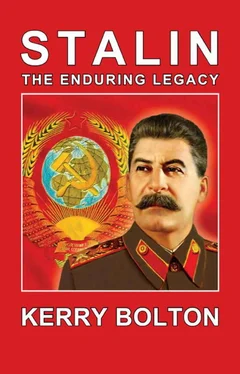Kerry Bolton
STALIN
THE ENDURING LEGACY
Joseph Stalin’s legacy continues to haunt geopolitical developments across the world. Stalin (‘Man of Steel’) ruled the USSR and later Soviet-Russian Empire with an iron fist from 1928 until his death in 1953. His individual resolve placed Russia on a course to national greatness by reversing the Bolshevik-Marxist psychosis that would have reduced Russia to chaos and destroyed the very soul of the Russian people.
In foreign policy Stalin assured Russia’s place as a world power and maintained the national and cultural freedom of Russia by rejecting the post-1945 international policy that the USA aimed at creating a one-world government.
In the arts Stalinism repudiated ‘rootless cosmopolitanism’ in favour of a Soviet culture based on a synthesis of Russian traditions.
This writer contends that had it not been for Stalin, we would have been living under a one-world state decades ago, and existing as economic automatons at the behest of global capitalism. The contention is also that the USA has long been the centre of ‘world revolution’, and continues to be so, while Stalin pursued a most un-Marxist policy of nationalism and imperialism.
Stalinism therefore constitutes a major force for tradition and conservatism in the world, against globalisation; while the USA maintains its mission as a centre of contagion that spreads throughout the world.
Such views on the USSR and Stalin are not new. In the early days of the Stalinist regime many on the German Right believed that the Soviet Union would transcend Marxism and become a nationalist state, which might form an alliance with Germany against the plutocratic powers. This was a primary position of the German National-Bolsheviks, a faction of the Right. Even the conservative historian Oswald Spengler saw the same possibility. From the Soviet side, Russian diplomats in Berlin were instructed to cultivate ties with pro-Soviet elements in the Right-wing intelligentsia. After World War II, when the USA had fallen out with its Russian wartime ally and sought German assistance against the USSR in the Cold War, German Rightist war veterans, who had fought against Russia, refused to do so again under American direction. Major-General Otto Remer and the allegedly ‘neo-Nazi’ Socialist Reich Party regarded the USA as more dangerous to the soul and freedom of Germany and Europe than the USSR. In the USA a faction of the Right also regarded the USSR as having transcended Marxism in favour of cultural and political health, recognising that their own country was the real centre of international subversion and revolution.
This book examines how the legacy of Stalin has had a lasting impact upon the world, and why the course Russia took under Stalin continues to be relevant to the present and the future. It is not intended as an apologia for Stalin’s crimes, for the Katyn massacre or the Ukrainian famine, etc. The bandying about of moralistic clichés about ‘crimes against humanity’ is often nothing but strategies to demonise one’s political adversaries by those who are hardly innocent themselves. It is intended rather to realistically assess Stalin’s impact on the present and coming struggles for world power, based on the belief that Russia must and will play a pivotal role in the shaping of a new geopolitical and cultural bloc that again says ‘nyet’ to the ‘rootless cosmopolitans’.
I
Stalin’s Fight Against International Communism
The notion that Stalin ‘fought communism’ at a glance seems bizarre. However, the contention is neither unique nor new. Early last century the seminal German conservative philosopher-historian Oswald Spengler stated that Communism in Russia would metamorphose into something distinctly Russian which would be quite different from the alien Marxist dogma that had been imposed upon it from outside. Spengler saw Russia as both a danger to Western Civilisation as the leader of a ‘coloured world-revolution’, and conversely as a potential ally of a revived Germany against the plutocracies. Spengler stated of Russia’s potential rejection of Marxism as an alien imposition from the decaying West that, Race, language, popular customs, religion, in their present form… all or any of them can and will be fundamentally transformed. What we see today then is simply the new kind of life which a vast land has conceived and will presently bring forth. It is not definable in words, nor is its bearer aware of it. Those who attempt to define, establish, lay down a program, are confusing life with a phrase, as does the ruling Bolshevism, which is not sufficiently conscious of its own West-European, Rationalistic and cosmopolitan origin. [1] Oswald Spengler, The Hour of Decision (New York: Alfred A Knopf, 1963), 61.
Even as he wrote, Bolshevism in the USSR was being fundamentally transformed in the ways Spengler foresaw. The ‘rationalistic’ and ‘cosmopolitan’ origins of Bolshevism were soon being openly repudiated and a new course was defined by Zhdanov and other Soviet eminences.
Contemporary with Spengler in Weimer Germany, there arose among the ‘Right’ the ‘National Bolshevik’ faction one of whose primary demands was that Germany align with the Soviet Union against the Western plutocracies. From the Soviet side, possibilities of an alliance with the ‘Right’ were far from discounted and high level Soviet sources cultivated contacts with the pro-Russian factions of the German Right including the National Bolsheviks. [2] K R Bolton, ‘Jünger and National-Bolshevism’ in Jünger: Thoughts & Perspectives Vol. XI (London: Black Front Press, 2012).
German-Soviet friendship societies included many conservatives. In Arbeitsgemeinschaft zum Studium der Sowjetrussichen Planwirtschaft (Arplan) [3] Association for the Study of the Planned Economy of Soviet Russia.
Conservative-Revolutionaries and National Bolsheviks comprised a third of the membership. Bund Geistige Berufe (BGB) [4] League of Professional Intellectuals.
was founded in 1931 and was of particular interest to Soviet Russia, according to Soviet documents, which aimed ‘to attract into the orbit of our influence a range of highly placed intellectuals of rightist orientation’. [5] K R Bolton, ‘Jünger and National-Bolshevism’, op. cit.
The profound changes caused Konstantin Rodzaevsky, leader of the Russian Fascist Union among the White Russian émigrés at Harbin, to soberly reassess the USSR and in 1945 he wrote to Stalin:
Not all at once, but step by step we came to this conclusion. We decided that: Stalinism is exactly what we mistakenly called ‘Russian Fascism’. It is our Russian Fascism cleansed of extremes, illusions, and errors. [6] Cited by John J Stephan, The Russian Fascists (London: Hamish Hamilton, 1978), 338.
In the aftermath of World War II many German war veterans, despite the devastating conflagration between Germany and the USSR, and the rampage of the Red Army across Germany with Allied contrivance, were vociferous opponents of any German alliance with the USA against the USSR. Major General Otto E Remer and the Socialist Reich Party were in the forefront of advocating a ‘neutralist’ line for Germany during the ‘Cold War’, while one of their political advisers, the American Spenglerian philosopher Francis Parker Yockey, saw Russian occupation as less culturally debilitating than the ‘spiritual syphilis’ of Hollywood and New York, and recommended the collaboration of European rightists and neo-Fascists with the USSR against the USA. [7] K R Bolton, ‘Francis Parker Yockey: Stalin’s Fascist Advocate’, International Journal of Russian Studies, Issue No. 6, 2010, http://www.radtr.net/dergi/sayi6/bolton6.htm
Others of the American Right, such as the Yockeyan and Spenglerian influenced newspaper Common Sense , saw the USSR from the time of Stalin as the primary power in confronting Marxism, and they regarded New York as the real ‘capitol’ of Marxism.
Читать дальше












